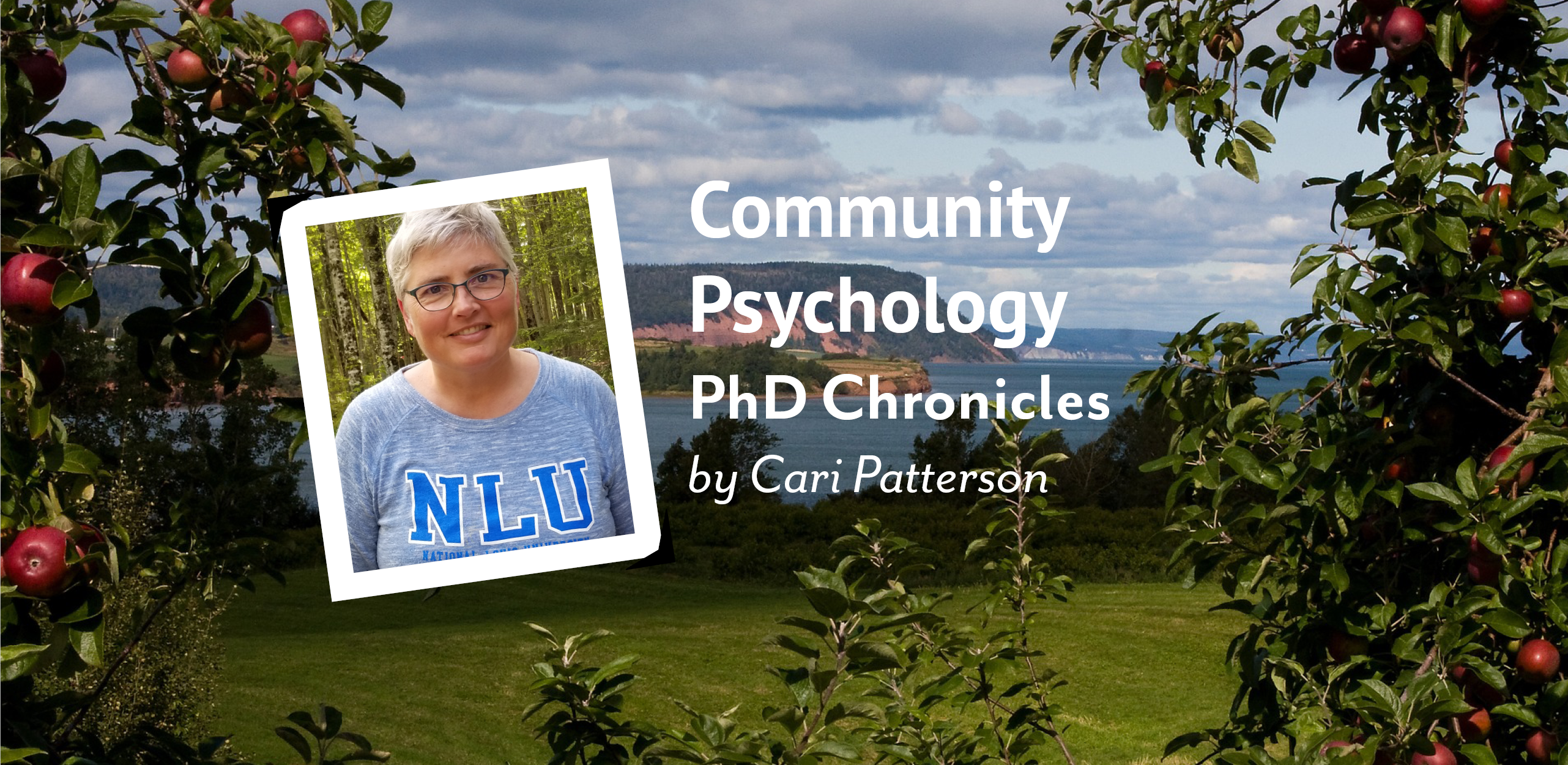Community Psychology PhD Chronicles

By Cari Patterson, Director, Research and Evaluation
Part One: Introduction
When I started working on my PhD last fall, one of my Community Psychology colleagues encouraged me to write a blog about the journey. It could be a place to capture learnings and reflections, exchange ideas with others and learn together, and also to just tell my story. It could be a little bit personal, a little bit professional, a little bit about my research, and a little bit about whatever else arises. So here goes: my first blog about working toward my PhD in Community Psychology. For this entry I’ll give a bit of background.
I first learned about Community Psychology in the mid 1980s; I had just moved to Nova Scotia from Saskatchewan, and I was working in a grocery store in Wolfville (which is a great way to get to know a community by the way). I had interesting conversations with a regular customer about the state of the world. One day, during Apartheid and the boycott on South African products, he came through my cash register with a bag of Granny Smith apples. I asked him ‘Pat, why are you buying these apples from South Africa?’ and he responded ‘Cari, why are you selling them?’. In that moment I knew that I needed to not only advocate for change, but to be part of changing the systems around us.
And that began my relationship with Dr. Pat O’Neill, a Community Psychologist teaching at Acadia University, where I completed my undergrad. Pat introduced me to Community Psychology and became my Advisor and Honours thesis supervisor. He encouraged me to present my thesis findings at the annual Canadian Psychological Association conference, where I attended a session on graduate studies in Community Psychology hosted by Wilfrid Laurier University, which offered the only core Community Psychology graduate program in Canada. Before long I found myself in the WLU Masters program. While I was there, I noticed a common question people asked each other was whether they were there as a stepping stone to a PhD, or to a job. I was there simply because I wanted to learn more about Community Psychology, and how to do it. I trusted that my path would unfold if I followed my heart.

“In that moment I knew that I needed to not only advocate for change, but to be part of changing the systems around us.”
Since then, I have incorporated elements of Community Psychology into my work coordinating programs and initiatives, leading organizations, running a consulting business for a couple of decades, and now as Director of Research & Evaluation with Inspiring Communities. And I have always longed for that feeling of Home that comes with being immersed in Community Psychology.
For about 20 years I searched for a way to participate in a PhD program. I knew I wanted to ground my practice in theory, contribute what I have learned to the field, and have time to think about the big picture of my work. I also knew that I didn’t want to uproot my family and turn my life upside down to do a PhD. I tried in vain to find a program that would allow me to participate from home, where my own community could benefit from my coursework and practicum while I was doing them. Despite many earnest efforts and even attempts to patch something together through interdisciplinary programs, I couldn’t find a way to make it happen.
And then along came Covid. One July day after paddle boarding last summer, I was thrilled to see a post on the Community Psychology listserv about National Louis University offering its PhD program online for the first time and opening it to students outside the country. I was even more thrilled when I learned that the program is designed for working professionals, and that it can be completed in three years. So in September, after a bit of a mad scramble to apply, organize my life, and find a way to cover the first term tuition fees, I found myself in Cohort 17 with a dozen other students, beginning the first year of my doctoral program. The students in my cohort are wonderful, the faculty are terrific, and the program is a great match for my life. The bar is high and I want to do my best.
And I’m not going to lie: this is extremely hard work. Working full time at a big job and studying full time is not for the faint of heart. Nor is it possible without a great deal of support. My workplace and my coworkers are very supportive of me pursuing my PhD; I can actively draw on the work I am doing in evaluating systems change to inform discussions and coursework, and my work is being enhanced by what I am learning in the program. My partner has agreed to do basically everything to keep our home and our family going for three years. Following the advice of a colleague who recently completed her PhD, I have taken a leave from all of my volunteer work and I am not doing anything extra. I am choosing this and I’m giving it everything I’ve got.
Next time I’ll talk about my research focus, which is about exploring the role of western evaluators in decolonizing evaluation, and exploring how evaluation capacity-building processes with Black and Indigenous communities can help do this.
Meanwhile, please share your comments, questions, experiences, ideas, critiques, references. I would love for this to be an exchange.
Share this:
Comments are closed